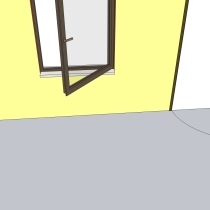You should definitely not meditate during times when you should be absolutely focused on the task at hand, such as when driving.
While some forms of meditation may be fine to do certain times, others should absolutely not be done (you wouldn't sit crossed legged with eyes closed and meditate while driving, would you?).
Other than the obvious times to not meditate, there are also times when it may be more efficient to not meditate at, such as right before bed. If you experience tiredness to the point where you are having trouble staying awake, and it is interfering with your meditation, then that may just not be a good for you to meditate.
Same for meditation in the morning. If you wake up and meditate right away, but feel that you have not woken up fully, or enough, and are falling asleep during the meditation, then that is probably not the best time for you either.
Other than that, I believe it is up to you to find the best times to meditate at, and the best time to not meditate at. This is very individual and there is no rule that applies to everyone.
Good luck!
Back and knee pain while sitting down during meditation is pretty common.
Even amongst people who are physically active, sitting down for long periods of time in a meditation pose can be quite difficult and painful.
Usually this is just a sign that your muscles are not used to the sitting position you are in, especially when sitting for longer periods of time.
People are normally not used to sitting up straight like you would during meditation, so even if someone who is generally physically active sits and meditates, they could also experience some discomfort in their back and knees due to those specific muscles not being used to being in that position.
For the knee and back pain, I find that the more consistent the practice is, the less they hurt. This is because the muscles get used to the sitting position. Though, this does not mean that you should sit for hours, and eventually it will stop hurting.
A consistent practice can also mean a 5-minute session once a day.
With all of that said and while slight discomfort when starting out is quite normal, if it really hurts to sit and meditate to the extent where you cannot continue, and you are suffering, then it may be worth checking it out with a doctor or a specialist, just to make sure nothing is wrong.
As for if improving flexibility can help, from my personal experience, yes, it can. I have also experienced pain in my upper and lower back, and in my knees while meditating. Usually it would start after around 5 minutes. Slowly, after consistently meditating for 10 minutes a day, the pain started to go away, and instead of it starting after 5 minutes, it would start after around 10 minutes, it would just get better and better slowly.
After stretching though, even while sitting for a 15-20 minute session, I wouldn't feel the pain. This isn't just pre-meditation stretching though, I would stretch on a regular basis.
Feeling tired during a meditation session is quite common.
One of meditations greatest benefits is its ability to calm us down and put us in a state of tranquility. That fact that you feel tired while meditating may just mean that it's working!
At what time do you meditate?
If you meditate close to bedtime, or right before, as many people do, then it makes sense that you will feel tired. When we go to sleep at the same time, or at a similar hour each night, we are basically training our bodies to understand at what time it should wind down and prepare to fall asleep.
If you choose to meditate around this time, you may just be giving your body extra signals that it needs to get ready to fall asleep. This is because in addition to it already being trained to know that it should be falling asleep soon, you are also giving it all the calming and relaxing signals meditation gives, which may amplify the bodies response and make you even more tired and sleepy.
If possible, try to meditate a little bit sooner so that you are not meditating right before bedtime.
If you meditate right in the morning, shortly after you wake up, and also feel tired, it may just mean that you have not fully woken up yet in order to meditate.
Meditate is a calming exercise, if you wake up in the morning still feeling tired from the night's sleep, and then you engage in a calming and relaxing exercise like meditation, your body may just continue to be sluggish and feel tired, causing you to feel even more tired than you may be after waking up.
If this is the case, try to meditate a little bit later if possible, or, if you are one to drink tea or coffee in the morning (or any other morning drink to wake you up), try meditating after drinking it.
Do you often get tired while sitting down?
There are certain health conditions that cause people to fall asleep and get tired pretty instantly. If you experience tiredness throughout the day while sitting, it may be worth seeing a health expert about this and explaining the situation.
A problem many people face when first starting out with meditation is that they find out just how busy and loud their minds are.
It's a common problem that not only beginners face, but also more advanced and experienced meditators.
Those that are more experienced may just know how to better deal with these situations and how to solve them and quiet their minds quicker than those that are just starting out.
One way to quiet your mind and to stop thoughts from coming while you meditate is to first try to understand what those thoughts are, why they are appearing, and to not fight them.
It's when we try to fight the thoughts that the stream of thoughts become uncontrollable, louder, and more intense.
Instead of fighting them and trying to forcefully expel them, leave them alone. See what those thoughts are and where they lead you to. Allow them to be there, present with you in that moment, and when the time is right, calmly release them and let them go.
Though this may take time to get better at, trying to force your mind to be quiet will probably not work and may just result in you not being able to meditate and quiet your mind.
Don't get angry, upset, or irritated at the thoughts. If they are showing up, it may be for a reason. These thoughts may be what is stressing you out, they may be what is causing your depression, anxiety, or other negative thoughts and emotions. Getting angry or upset will do no good. Instead, accept the situation, and allow it to be until you are able to calmly release those thoughts.
If new thoughts appear, that is ok. Repeat the process, allow them to be. Learn from them, see where they take you, and when you are ready, release them.
As you progress, you will be able to do this much easier and quicker, and eventually will be able to start your meditations with a clearer mind, free from the stream of thoughts. It just takes time, like any other practice.
Expecting to start a meditation practice and not have thoughts is a fair way to burn out from practicing at all, since this is just usually not how meditation works.
Throughout our lives, we have allowed our minds to run wild, without control. Being quiet, for most people, is just not something they have trained themselves to do. Meditation and quieting the mind are skills that need to be developed, and for many, they go against who they have been their whole life, as their whole life was spent without controlling their minds and thoughts.
There are many forms of meditation. One form is guided meditation.
In a guided meditation, there will usually be an element that guides you through the meditation itself. This could be a person talking and guiding you, it could be a sound, or it could even be both.
Many guided meditations incorporate the element of sound. These sounds could be the sound of rain, rivers, wind, bells, or even music.
Sound is a useful element in meditation due to how easy it is to follow and stay focused on the sound.
This is especially helpful for beginners who are just starting out with meditation and find it difficult to sit and meditate for long and even short periods of time.
Many beginners and even more experienced meditators, incorporate sound and music into their meditations as it allows them to focus better and get into a meditative state faster.
It also helps in situations where it is difficult to find a quiet place. Putting on music or meditative sounds can reduce the background noise that would otherwise bother you, and allow you to follow the sounds and get into a meditative state.
There is no real limit to what sounds can be used. Just as meditation is a different experience for everyone, so can the sounds being used be different from person to person. Some people find it calming to meditate to the sound of a river stream, while others may prefer the sound of the wind blowing through the forest trees.
Other common sounds are calming acoustic instruments, and abstract sounds.
There is also no limit in terms of the origin of these sounds. If you live near a forest, a river, or any form of nature, it can be incredibly calming to have a meditation session in nature. If you do not have that option, then even putting on music or sounds on your phone is a great option.










